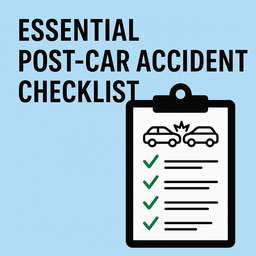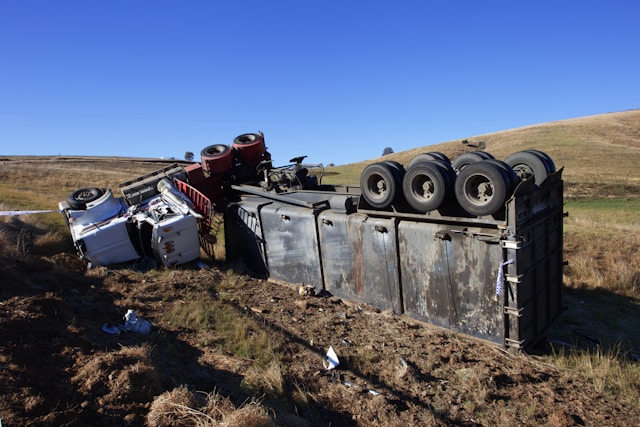Summary
Being involved in a car accident, especially one involving a truck, can be a traumatic experience. However, the actions you take immediately after the accident are crucial in protecting your legal rights and ensuring you receive fair compensation. In this comprehensive checklist, we cover the essential steps to take after an accident, focusing on the specific considerations for truck accidents. Following these steps will help safeguard your interests and pave the way for a successful outcome with the help of a truck accident lawyer.
Key Takeaways
- Prioritize Safety: Make sure you’re in a safe location and check for injuries.
- Call the Authorities: Contact 911 to report the accident and request medical assistance.
- Document the Scene: Gather evidence through photos, witness information, and detailed notes.
- Seek Medical Attention: Even if injuries aren’t immediately apparent, it’s important to get checked.
- Consult a Truck Accident Lawyer: Legal guidance can help protect your rights and pursue compensation.
Immediate Actions at the Accident Scene

1. Ensure Safety and Assess Injuries
- Move to a Safe Location: After the accident, move your vehicle to a safe place to avoid blocking traffic. This is important not only for your safety but also for the safety of others on the road.
- Check for Injuries: Assess yourself and others involved in the accident for injuries. Do not attempt to move anyone who is injured unless it is necessary to prevent further harm.
2. Call Emergency Services
- Dial 911: Reporting the accident to the police is crucial for documentation. They will file an official report, which is often required for insurance claims and legal proceedings. Additionally, if there are injuries, emergency medical services can provide timely assistance.
- Why You Need a Police Report: According to US News, a police report serves as an official record of the accident and can be used as evidence when pursuing claims or defending against liability.
Gathering Evidence
3. Document the Scene
- Photograph the Scene: Take clear, comprehensive photos of the scene, including vehicle damages, the positions of the cars, nearby traffic signs, and any visible injuries. These images will serve as valuable evidence if the case goes to court or if you’re filing an insurance claim.
- Record Environmental Conditions: Note the weather, road conditions, and lighting at the time of the accident. This information could be critical, especially if conditions contributed to the crash.
4. Collect Information
- Exchange Information with the Other Driver: You should obtain:
- Full names and contact details
- Driver’s license numbers
- Insurance company information and policy numbers
- Vehicle descriptions (make, model, and license plate numbers)
- Witness Information: If there are any witnesses, collect their names and contact information. Their statements can help clarify the events leading to the accident.
Post-Accident Procedures
5. Seek Medical Attention
Even if you don’t feel injured at the moment, it’s crucial to seek medical attention. Injuries like whiplash, internal injuries, or concussions might not show immediate symptoms. A medical evaluation helps ensure your health and provides documentation for any future claims.
- Why You Shouldn’t Wait: In cases of truck accidents, injuries may be more severe due to the size and weight of the vehicle. Even minor injuries can become serious later on.
6. Notify Your Insurance Company
- Report the Accident: Contact your insurance provider to inform them of the accident. Be honest about the details but avoid admitting fault at this stage.
- Insurance Information: Share only factual information and leave out emotional reactions or speculative statements, which could be used against you.
Legal Considerations
7. Consult a Truck Accident Lawyer
If you’ve been involved in a truck accident, it’s especially important to consult an experienced truck accident lawyer to help protect your rights. Truck accidents often involve more complex issues, including federal and state regulations governing trucking, driver logs, and maintenance records.
- Why Legal Support is Crucial: Trucking companies have legal teams that work to protect their interests. Without a lawyer on your side, you may find yourself at a disadvantage when pursuing compensation.
8. Preserving Evidence
One of the main advantages of hiring a lawyer is that they can help you preserve critical evidence that might otherwise be overlooked. Some examples include:
- Driver logs (showing hours of service)
- Vehicle maintenance records
- GPS data, black box data, and dashcam footage
- Federal and state trucking regulations
These pieces of evidence could be key to proving liability in a truck accident case. Truck accident lawyers are familiar with the evidence that needs to be preserved and can guide you through the process.
Additional Tips
9. Do Not Admit Fault
It’s essential not to admit fault at the scene of the accident. Even if you feel responsible, there may be factors you aren’t aware of, such as the truck driver being at fault due to faulty brakes or other mechanical issues. Always refrain from discussing fault with anyone except the police and your lawyer. According to Law.com, making an admission of fault could significantly affect your claim or defense.
10. Keep Detailed Records
- Create a Case File: Maintain a file with all documents related to the accident, including:
- Medical records
- Police reports
- Repair estimates
- Correspondence with insurance companies
- Organize Your Communication: Keep a record of all communication with insurance companies, lawyers, and healthcare providers. This ensures that you have everything in order when it’s time to file your claim or present evidence.
11. Be Cautious with Insurance Adjusters
Insurance adjusters may approach you with an initial offer, but don’t accept any settlement without consulting your lawyer. Truck accident claims can be complex, and initial offers may not fully cover your damages or future medical expenses. Always seek the advice of a personal injury lawyer before accepting any settlement.
Conclusion
The aftermath of a car accident, particularly one involving a truck, can be overwhelming. However, the actions you take immediately after the incident will greatly impact your ability to secure fair compensation and protect your legal rights. By following the steps outlined in this checklist, you ensure that you’re taking the right steps for a successful claim. Most importantly, having an experienced truck accident lawyer on your side can guide you through the complex legal and insurance processes, ensuring the best possible outcome.
Key Takeaways Recap
- Safety First: Always prioritize your safety and seek medical attention, even for minor injuries.
- Document Everything: Gather as much evidence as possible at the scene of the accident, including photographs and witness statements.
- Consult Legal Experts: An experienced truck accident lawyer will help you navigate the complexities of the case and advocate for your rights.
By following this checklist, you increase your chances of a favorable outcome and ensure you’re doing everything possible to protect yourself and secure the compensation you deserve.
Frequently Asked Questions (FAQs)
1. What Should I Do Immediately After a Truck Accident?
Answer:
After a truck accident, your first priority should be ensuring everyone’s safety. Move to a safe location, check for injuries, and call emergency services. It’s crucial to file a police report and document the scene by taking photos and gathering witness information. Additionally, contact your insurance provider, but avoid admitting fault at the scene. For legal support, consider consulting a truck accident lawyer to protect your rights and navigate the claims process.
2. How Do I Know If I Have a Strong Truck Accident Case?
Answer:
A strong case typically involves clear evidence of the truck driver’s negligence, such as excessive speed, fatigue, or improper vehicle maintenance. Gathering evidence like police reports, witness statements, and the truck driver’s logs is vital. An experienced truck accident lawyer can help evaluate your case based on these factors and advise whether you should move forward with a claim. Your lawyer can also help preserve crucial evidence like black box data and vehicle maintenance records.
3. Can I File a Truck Accident Claim Even If the Accident Was Partially My Fault?
Answer:
Yes, you may still file a claim if the accident was partially your fault, but it will depend on your state’s comparative negligence laws. Some states allow you to recover damages even if you’re partially at fault, but the compensation may be reduced. A personal injury lawyer can help you navigate this process and determine how your state’s laws will affect your compensation. They can also help identify factors like truck driver negligence that might reduce your responsibility in the accident.
4. What Kind of Compensation Can I Receive for a Truck Accident?
Answer:
Compensation from a truck accident can cover medical expenses, lost wages, pain and suffering, and property damage. In severe cases, you may also be entitled to punitive damages. A truck accident lawyer will assess the full extent of your damages, including long-term care and rehabilitation costs, to ensure you receive adequate compensation for your injuries. Make sure to keep detailed records of all your medical treatments and expenses to support your claim.
5. How Long Do I Have to File a Truck Accident Lawsuit?
Answer:
The statute of limitations for filing a truck accident lawsuit varies by state, but typically ranges from 1 to 3 years. It’s important to consult a personal injury lawyer as soon as possible after the accident to ensure you don’t miss your filing deadline. The lawyer will help you gather evidence, file the claim, and meet all legal deadlines. Delays can affect your ability to recover damages, so timely action is essential.
References
- What to Do After a Truck Accident – Helping Injured People
- Truck Accident Claims: Everything You Need to Know – Friedman, Hirst, and Peltz
- Personal Injury Lawyers: What They Do and Why You Need One – Nolo
- Filing Your Insurance Claim After a Truck Accident – Nationwide
- Statute of Limitations for Personal Injury Claims – FindLaw
- Whiplash: Symptoms, Causes, and Treatment – Mayo Clinic
- Choosing the Best Truck Accident Lawyer – Helping Injured People
This article is designed to help those involved in truck accidents understand the critical steps to take afterward, providing clarity and actionable guidance. If you need further assistance, don’t hesitate to reach out to a professional truck accident lawyer to ensure your rights are protected and your case is handled efficiently.

